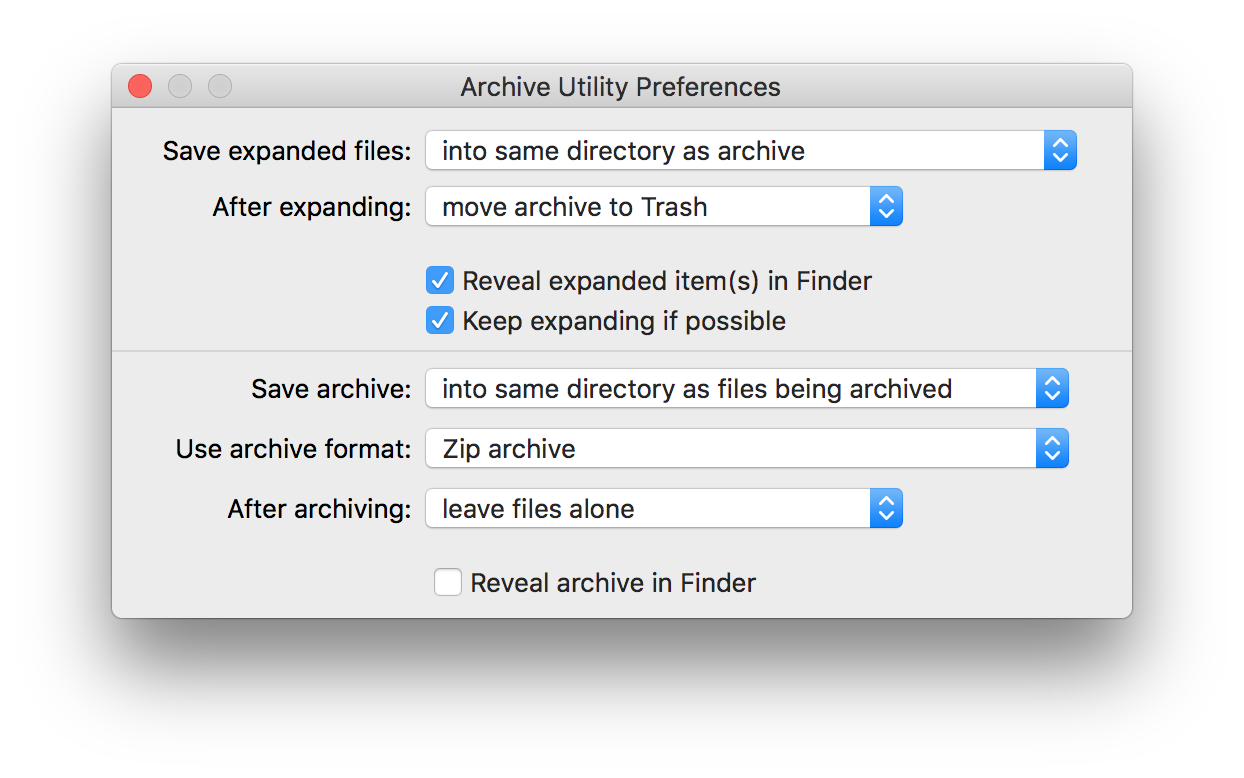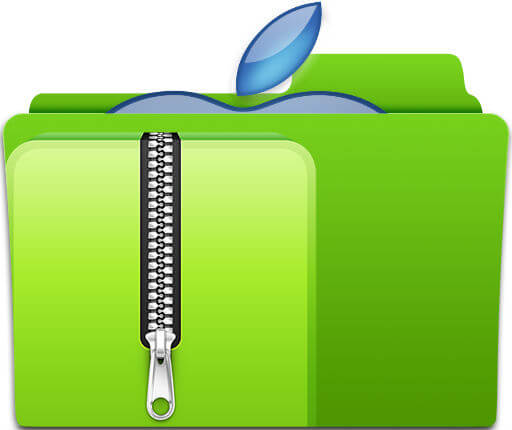Download 7-Zip for MacOS. 7Zip is a great app that should be included on iTunes. As productivity is a concern on all Apple devices, the development of 7Zip would be a great delight for all its users. I mean, why not? It is the most powerful and secure archiving and file compression tool in its category and field. For more resources about 7Zip for other operating systems, check out our other articles on 7Zip.
- Archive Utility Download Mac
- Free Mac Utility
- Archive Utility For Mac
- Archive Utility App Mac Download Software
Step 2: Download a Zip password cracker or a brute force software like. Advanced Archive Password Recovery; or Any other in your knowledge; Step 3: Good Zip Password cracker’s are available for WIN. SO after downloading the software, which will be in.exe which mac can’t run. Open the.exe via wine to Install the program and run it. An installer.app with 4.297.782 Byte NOTHING ELSE! No shared support, no installESD.dmg, OSinstall.mpkg NOTHING! Where the 7,77GB download size came from is a brainteaser of outerspace levels to me! Not worth the time, as I can see!
So, you are one of the opulent citizens of the society or perhaps meticulous with the software and security, thus, you prefer using Mac computers. As a matter of fact, some programs and software for Windows, Linux, and for Mac are programmed differently. This goes the same with 7Zip for Mac.

By default, Mac OS X is incapable of handling these files. But this shouldn’t be much of an issue as there are lots of other archiving tools available that can open a .7z file and other file compression formats.
The 7Zip file format is considered a better file compression format because of its high security and overall stability. It 7Zip can compress any file much better than ZIP and WinRAR or WinZip. This makes 7Zip safer and a much better choice.

Contents
- 1 A Walkthrough on 7-Zip for Mac
- 1.1 Reminder
A Walkthrough on 7-Zip for Mac
Keep on reading as we are going to walk you through on the steps for opening .7z archive files regardless of what version of Mac OS you are using. Don’t worry, it is easy and quick to do even it gets an error cannot open a file as archive sometimes. Here’s how it goes.
- Download “The Unarchiver” first. The latest version is 4.2.2 and support macOS 10.7 or later. the file is 13.6 MB. You can either download it from the Mac App Store or click here for direct download.
- The app is relatively small so you should be able to get it installed for a few seconds depending on your internet speed.
- As soon as The Unarchiver app finishes installing, open it and you will see the file association list.
- Launch the Unarchiver and there you’ll find the file association list, inform the Unarchiver to associate it with .7z files.
- The moment that you’ve associated the Unarchiver with .7z you could then double-click any .7z file on your Mac computer. It will then open and uncompress like other archive format or launch Unarchiver and just drag and drop the 7z files to the utility.
This is everything that you have to know in opening any .7z archive files saved on your Mac computer. After installing the UnArchiver and associated it with .7z 7Zip files, you may now launch the .7z archive simply by double-clicking on it. Inside the UnArchiver utility, your file will open and decompress the original 7z file. It will exit the app automatically when it is finished. It is possible to directly open the Unarchiver and open the file in the Unarchiver directly where it’ll be extracted.
Reminder
Since 7Zip archives have undergone a strong compression procedure, it sometimes takes a while in order to completely extract large 7z files. Don’t be surprised as well if the 7Zip has expanded to something bigger than the original file size as the size of the archive. This is totally normal. Just be sure that you have enough disk space to accommodate all the uncompressed data.
Unarchiver is a well-known solution to all kinds of archive formats available on Mac. It’s been discussed as an alternative when you have to unRAR and open RAR files in Mac OS and it can open virtually any archive format you might come across. This can include but not limited to:
- 7z
- zip
- sit
- tgz
- tar
- gz
- rar
- bzip and;
- hqx
Due to its expansive nature and free of charge, it is a wonderful addition to your Mac software toolkit. Well, it is comparable to a Swiss army knife but for computers.

The Complete Package
The Unarchiver provides support to every release of the Mac OS software that’s in use. This is regardless if you’re using the latest release, Sierra, macOS High Sierra, Mac OS X El Capitan, Mountain Lion, Mavericks, Snow Leopard, Yosemite, and so forth. It’ll work and can get the job done in opening and decompressing zip as well as other archive formats available.
ZIP is an archive file format that supports lossless data compression. A ZIP file may contain one or more files or folders that may have been compressed. The ZIP file format permits a number of compression algorithms. The format was originally created in 1989 by Phil Katz, and was first implemented in PKWARE, Inc.'s PKZIP utility, as a replacement for the previous ARC compression format by Thom Henderson. The ZIP format is now supported by many software utilities other than PKZIP. Microsoft has included built-in ZIP support (under the name 'compressed folders') in versions of Microsoft Windows since 1998. Apple has included built-in ZIP support in Mac OS X 10.3 (via BOMArchiveHelper, now Archive Utility) and later. Most free operating systems have built in support for ZIP in similar manners to Windows and Mac OS X.
ZIP files generally use the file extensions '.zip' or '.ZIP' and the MIME media type application/zip. ZIP is used as a base file format by many programs, usually under a different name. When navigating a file system via a user interface, graphical icons representing ZIP files often appear as a document or other object prominently featuring a zipper.
ZIP is one of the most widely used compressed file formats. It is universally used to aggregate, compress, and encrypt files into a single interoperable container. No specific use or application need is defined by this format and no specific implementation guidance is provided. This document provides details on the storage format for creating ZIP files. Information is provided on the records and fields that describe what a ZIP file is.

Open/Extract ZIP File on Windows
To open/extract ZIP file, you can use Windows built-in feature, or use a more professional freeware. It's Easy 7-Zip. The Easy 7-Zip is an easy-to-use version of 7-Zip. The open source freeware keeps all features of 7-Zip and adds a few useful features that makes the software more user-friendly.
Easy 7-Zip works on Windows 10/8.1/8/7/Vista/2008/2003/XP/2000 (both 32-bit and 64-bit compatible).
- Free Download Easy 7-Zip
- Install Easy 7-Zip by step-by-step instructions
- The installation will associate ZIP with Easy 7-Zip automatically
- Double-click on ZIP file to open ZIP file with Easy 7-Zip
- Alternatively, Right-click on ZIP file on Windows Explorer
- Done
You will see files or folders within the ZIP file then, click button Extract to extract the ZIP file.
And then, choose Extract files..., Extract Here, or Extract to 'folder' to extract the ZIP file.
Easy 7-Zip Download Links:
Open/Extract ZIP File on Mac
To open/extract ZIP file on Mac, you can use B1 Free Archiver. B1 Free Archiver is a free software for creating archive folder and extracting archive file. B1 Archiver works on all platforms - Windows, Linux, Mac and Android. The freeware supports most popular formats including ZIP.
Archive Utility Download Mac
B1 Free Archiver is compatible with:
- Mac OS X 10.9 Mavericks
- Mac OS X 10.8 Mountain Lion
- Mac OS X 10.7 Lion
- Mac OS X 10.6 Snow Leopard
Free Mac Utility
Open/Extract ZIP File on Linux
You need to install unzip. unzip lists, tests, or extracts files from a ZIP archive. The default behavior (with no options) is to extract into the current directory (and subdirectories below it) all files from the specified ZIP archive. A companion program, zip, creates ZIP archives; both programs are compatible with archives created by PKWARE's PKZIP and PKUNZIP, but in many cases the program options or default behaviors differ.
Install unzip on CentOS and Fedora
| # yum install unzip |
Install unzip on Debian and Ubuntu
| $ sudo apt-get install unzip |
Extract a ZIP file on Linux
| $ unzip sample.zip |
Archive Utility For Mac
Extract to a particular destination directory, you can use:

| $ unzip sample.zip -d <destination_directory> |
Archive Utility App Mac Download Software
Copyright © 2013-2017 James Hoo All rights reserved.